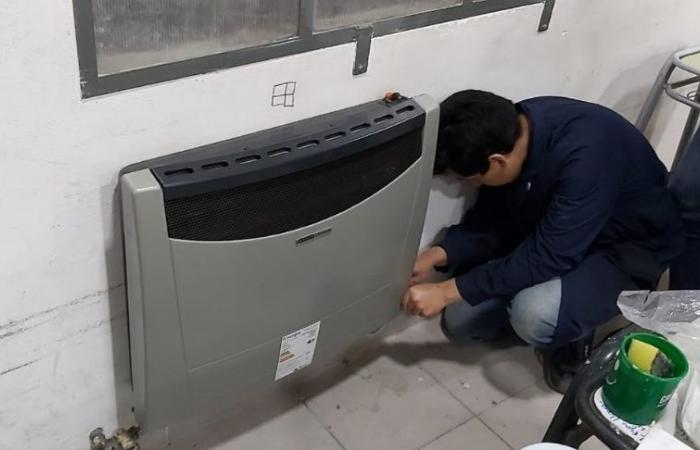At least 15 primary, secondary and kindergarten schools in the Lanús district operate without gas supply. In some of them, repair work has begun, but in others, suspension of classes is being considered due to the cold in the classrooms.
The gardens and other affected educational institutions operate without a gas supply after having received an inspection from Metrogas that found irregularities in the facilities, which led to the subsequent cutoff of the service to repair the problems.
However, Suteba-Lanús authorities assured AUNO that the works “have begun in some” institutions because a budget allocation was received from the provincial government.
A COLDER WINTER
The director of the Technical School 8 “Almafuerte”, Gustavo Castro, told this agency that on December 12, the distributor carried out an inspection in which they found defects in the facilities and therefore decided to cut off the service.
The decision of the national government to stop public works and the financing of school infrastructure, and also rule out the sending of educational funds to the provinces, resulted in some educational establishments considering the possibility of suspending classes in the face of a colder winter than expected. usual.
Castro anticipated that if things are not normalized, they will “start cutting (school days)” because the cold “is unbearable.” He had thought about this alternative for last May, when a cold wave arrived, but the provincial authorities “won’t let us cut classes.”
Although the provincial school administration does not allow it, classes are being suspended for other reasons, since “teachers are sick and children are sick with the flu” and are losing days of attendance.
“THEY CUT DIRECTLY”
The situation is similar in Secondary School 29, in the town of Villa Industriales, where Primary School 54 “Islas Malvinas” also operates, and Kindergarten 918 “La Bandera”. The lack of gas there dates back to February when Metrogas visited the establishment and decided to cut off the supply for not complying with safety regulations that guarantee safe use.
The director of the secondary school, Emiliano Caracciolo, told AUNO that in February the institution received “a review of the facilities, and it turned out that there were things that should not be connected as required by Metrogas regulations, and they cut them off directly.”
“We are now waiting for the necessary repairs to be made so that Metrogas can re-enable the service,” he said.
In addition, he explained that the Municipality of Lanús provides them with resources to offer food service to the students, but clarified that “the food is the same as always, the issue is how to make it since there is no gas.” That is why they prepare it with “electric ovens” and heat water for tea or cooked mate with electric kettles. “We manage as best we can,” acknowledged the manager.
“UNLOCK THE SITUATION”
Asked about the schools’ complaints, the general secretary of Suteba-Lanús, Natalia Salomoni, reported that the School Board and the Municipality of Lanús received “140 million pesos” to advance the works and “40 million for the purchase of appliances and lighting.”
“The works began the first week of June and are executed by the School Council and the Infrastructure Directorate of the Municipality’s Education Secretariat,” he noted. And although they are not able to give an immediate response in the face of the first cold weather, at this moment the gas situation in schools would begin to be unblocked.”
The leader also valued maintenance management in the institutions because it is “a policy of care for students and all workers, teachers and non-teachers.” She remembered “what the explosion was like (at Elementary School 49) in Moreno” and brought to mind the “vice principal Sandra and the assistant Rubén” who were victims of the tragedy that occurred as a result of a gas leak.
Regarding the delay in restoring the service, Salomoni said that it is due to “the problem that the province of Buenos Aires is going through with the lack of funding for education by the national government.” In this sense, he asserted that “this will increase if the educational policies or non-policies of the national government do not reach the province of Buenos Aires” and “the complexity that is being experienced will be increasingly noticeable.”
“To guarantee decent and safe building conditions” in educational establishments “a budget and investment are needed, and without national financing, many of the possible actions are conditioned,” said Salomoni.
DR-AFD
AUNO-06-28-2024


